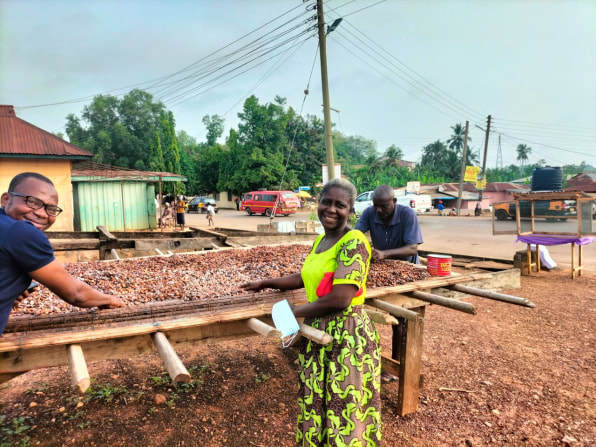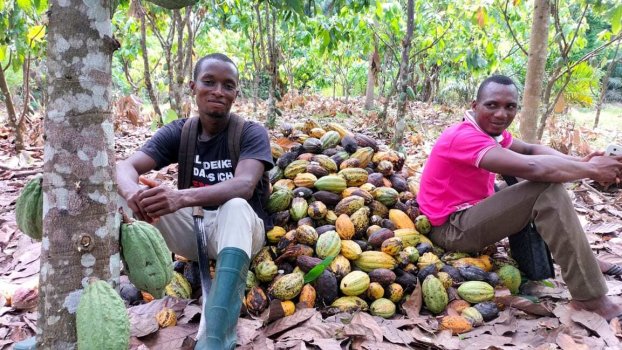K
Kathleen Martin
Guest
Climate change is creating a nightmare scenario for subsistence farmers around the world.
Subsistence farms are typically small operations, often less than 2 hectares, with outsize importance to the families that operate them, and to the surrounding community that relies on the crops. As of 2013, nearly 2 billion people on the planet relied on small-scale subsistence farms for survival. But those farms are in trouble: Rising CO2 levels have increased the likelihood and severity of extreme weather events like droughts, floods, and wildfires—a trend that can leave those farmers with nothing to eat and no money to buy food elsewhere. According to the Food and Agriculture Organization of the United Nations, extreme weather disasters cost developing nations’ agriculture sectors $108 billion between 2008 and 2018.
But one company thinks it can help solve the problem with a seemingly unlikely tool: blockchain.
Using blockchain technology to protect people from climate change might sound a bit like using gasoline to protect against a blaze, but the Lemonade Crypto Climate Coalition, which launched last week, says that’s exactly what it wants to do.

Cocoa farmers drying their crop in sub-Saharan Africa [Photo: Pula/Lemonade]
Most blockchain technology is famous for being energy intensive: One Bitcoin transaction uses enough energy to power an average U.S. house for six weeks, according to some analyses. Put another way, each Bitcoin transaction is equivalent to releasing 402 kilograms of CO2. The Lemonade Crypto Climate Coalition, a new nonprofit arm of insurance tech firm Lemonade Foundation, believes it can leverage blockchain technology to provide insurance against climate disasters for upward of 2 billion subsistence farmers on the planet, and avoid making the planet hotter while doing it. The Lemonade Foundation is focusing its early efforts in Africa but wants to one day bring its ideas to South America, Asia, and anywhere else where small-scale farmers need crop insurance.
Climate insurance is not a new concept, but providing the service to subsistence farmers has been difficult historically. Claims are often small—on the order of tens of dollars—meaning that it’s incredibly difficult for traditional insurers to underwrite and process claims and still make money. “Everything’s upside down. It costs you more to service the claim than the claim itself,” says Daniel Schreiber, Lemonade’s cofounder and CEO.
Continue reading: https://www.fastcompany.com/90735778/can-blockchain-tech-help-farmers-get-climate-insurance
Subsistence farms are typically small operations, often less than 2 hectares, with outsize importance to the families that operate them, and to the surrounding community that relies on the crops. As of 2013, nearly 2 billion people on the planet relied on small-scale subsistence farms for survival. But those farms are in trouble: Rising CO2 levels have increased the likelihood and severity of extreme weather events like droughts, floods, and wildfires—a trend that can leave those farmers with nothing to eat and no money to buy food elsewhere. According to the Food and Agriculture Organization of the United Nations, extreme weather disasters cost developing nations’ agriculture sectors $108 billion between 2008 and 2018.
But one company thinks it can help solve the problem with a seemingly unlikely tool: blockchain.
Using blockchain technology to protect people from climate change might sound a bit like using gasoline to protect against a blaze, but the Lemonade Crypto Climate Coalition, which launched last week, says that’s exactly what it wants to do.

Cocoa farmers drying their crop in sub-Saharan Africa [Photo: Pula/Lemonade]
Most blockchain technology is famous for being energy intensive: One Bitcoin transaction uses enough energy to power an average U.S. house for six weeks, according to some analyses. Put another way, each Bitcoin transaction is equivalent to releasing 402 kilograms of CO2. The Lemonade Crypto Climate Coalition, a new nonprofit arm of insurance tech firm Lemonade Foundation, believes it can leverage blockchain technology to provide insurance against climate disasters for upward of 2 billion subsistence farmers on the planet, and avoid making the planet hotter while doing it. The Lemonade Foundation is focusing its early efforts in Africa but wants to one day bring its ideas to South America, Asia, and anywhere else where small-scale farmers need crop insurance.
Climate insurance is not a new concept, but providing the service to subsistence farmers has been difficult historically. Claims are often small—on the order of tens of dollars—meaning that it’s incredibly difficult for traditional insurers to underwrite and process claims and still make money. “Everything’s upside down. It costs you more to service the claim than the claim itself,” says Daniel Schreiber, Lemonade’s cofounder and CEO.
Continue reading: https://www.fastcompany.com/90735778/can-blockchain-tech-help-farmers-get-climate-insurance

